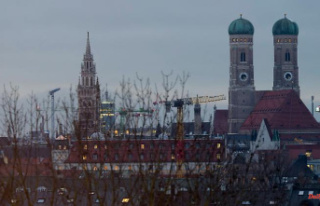The 9-euro ticket has been very popular in recent months - and the voices for a successor are increasing. Now the Association of Towns and Municipalities is putting pressure on a conference of transport ministers.
Before a special conference of the transport ministries of the federal states, the German cities and municipalities are calling for a quick successor solution for the 9-euro ticket, which is due to expire next week. "The goal should be a permanently cheap, uniform ticket, such as a 365-euro annual ticket," said the general manager of the association of cities and municipalities, Gerd Landsberg, of the "Augsburger Allgemeine". Landsberg warned against a long ongoing discussion.
"The German Association of Towns and Municipalities expects the federal states to finally put an end to the polyphony and to agree on a uniform line on how the traffic turnaround must be promoted," said Landsberg. This includes an end to the "tariff jungle" in local public transport and a "nationally uniform ticket," Landsberg demanded. However, a continuation of the 9-euro ticket is "hardly to finance".
"In addition, the federal states must organize sustainable and long-term investments in local public transport," Landsberg demanded. "We need more buses, more trains and more rail-bound traffic to attract more commuters to public transport," he emphasized. "However, we must also bid farewell to the illusion that these goals can be achieved in the short term. The necessary expansion will take years, if not decades."
Nevertheless, the transport ministers should not put the issue on the back burner. "What's important now is a clear signal from the federal states that things are finally starting," Landsberg demanded. "Of course, the federal government must also participate in a joint solution and contribute to financing that must also include the increased energy prices," explained the managing director of the municipal umbrella organization. "The federal government will be more willing to do this if the federal states now agree on a uniform line," Landsberg warned of a quick compromise on the future of regional and local transport. "In transport policy, too, we should act long-term and sustainably instead of constantly discussing new ideas."
In the morning, the transport ministers of the federal states will discuss the consequences of rising energy costs for public transport via video link. Federal Transport Minister Volker Wissing will not take part in the conference. It is about establishing a common position towards the federal government, said a spokesman for Bremen's mobility senator Maike Schaefer, who currently chairs the conference of transport ministers.
The federal states are demanding additional funds from the federal government because of the high energy costs. The transport associations have lost revenue like in the times of the Corona crisis - analogous to the Corona rescue package, there must now be an "energy rescue package", said Schaefer's spokesman. In addition, it should be about possible follow-up regulations for the 9-euro ticket.
Federal Chancellor Olaf Scholz had in principle committed to a successor regulation for the nine-euro ticket. Although this cannot be continued in the same way for cost reasons, there should be a new offer that primarily takes up the principle of the simplicity of the ticket. "We have decided that we will develop something that will come soon," said Scholz on Thursday evening at a public dialogue in Magdeburg.












